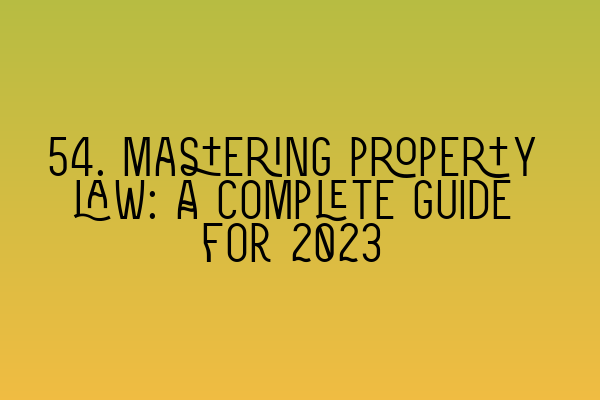Mastering Property Law: A Complete Guide for 2023
Welcome to SQE Property Law & Land Law, where we are committed to providing you with the most comprehensive and up-to-date information on property law. Whether you are a law student preparing for the SQE exams or a seasoned solicitor looking to brush up on your knowledge, this guide is designed to help you master property law in 2023.
1. Understanding the Basics
Before diving into the complexities of property law, it’s essential to have a solid understanding of the basics. Property law encompasses a wide range of legal principles and rules that govern the ownership, use, and transfer of real estate. This includes everything from residential and commercial properties to land and fixtures.
If you’re just starting your journey, we recommend familiarizing yourself with fundamental concepts like freehold and leasehold, legal estates and interests, land registration, and the difference between personal and real property. These concepts provide the foundation for more advanced topics in property law.
For a detailed explanation of these concepts, check out our SQE 1 Practice Exam Questions article.
2. Exploring Ownership Rights
Ownership is a central theme in property law. Understanding the different types of ownership rights is crucial for advising clients on property-related matters. In this section, we delve into the various forms of ownership, including sole ownership, joint tenancy, tenancy in common, and leasehold.
We also explore the concept of adverse possession, where a person can become the legal owner of property by openly occupying it for a certain period of time. Adverse possession can be a complex area of property law and is often a topic that comes up in examinations.
To further enhance your understanding of ownership rights, take a look at our SQE 1 Practice Mocks FLK1 FLK2 article.
3. The Conveyancing Process
Conveyancing is the legal process of transferring ownership of property from one party to another. Whether you’re acting on behalf of a buyer or a seller, having a thorough understanding of the conveyancing process is essential.
In this section, we walk you through the key steps involved in conveyancing, including pre-contract enquiries, searches, exchange of contracts, and completion. We also discuss the role of solicitors, mortgage lenders, and surveyors in the conveyancing process.
For a comprehensive guide on the conveyancing process, don’t miss our SQE 2 Preparation Courses article.
4. Leasehold and Freehold Properties
A significant portion of property in the UK is held under leasehold or freehold ownership. Understanding the nuances and implications of both types of ownership is essential for property law practitioners.
In this section, we explore the rights and responsibilities of leaseholders and freeholders, the importance of service charges and ground rents, and the process of extending leases. We also discuss the impact of leasehold reform on property transactions.
To gain a comprehensive understanding of leasehold and freehold properties, refer to our SQE 1 Preparation Courses article.
5. Land Registration
Land registration plays a vital role in establishing ownership and protecting property rights. In this section, we delve into the process of land registration, the role of the Land Registry, and the benefits of a registered title.
We also discuss adverse possession claims in relation to land registered with the Land Registry and explore the circumstances under which a title can be challenged or rectified.
For more information on the land registration process, take a look at our SRA SQE Exam Dates article.
6. Navigating Complex Property Disputes
Property disputes can arise in various scenarios, such as boundary disputes, landlord and tenant disagreements, and co-ownership disputes. As a property law practitioner, it’s essential to have the knowledge and skills to help clients navigate these complex situations.
In this section, we discuss the common types of property disputes, the dispute resolution process, and the role of alternative dispute resolution methods like mediation and arbitration. We also explore recent case law developments that have shaped property dispute resolution.
For a comprehensive understanding of property dispute resolution, refer to our SQE 2 Preparation Courses article.
Conclusion
Property law is a vast and intricate area of practice that requires a deep understanding of legal principles, rights, and obligations. Mastering property law in 2023 requires a commitment to continuous learning and staying updated with the latest developments in the field.
We hope this complete guide has provided you with valuable insights and resources to enhance your knowledge of property law. Remember to take advantage of our related articles on SQE 1 and SQE 2 exam preparation to further solidify your understanding.
If you have any questions or would like further guidance on property law, please don’t hesitate to contact us at SQE Property Law & Land Law. Our team of expert solicitors is here to assist you.
